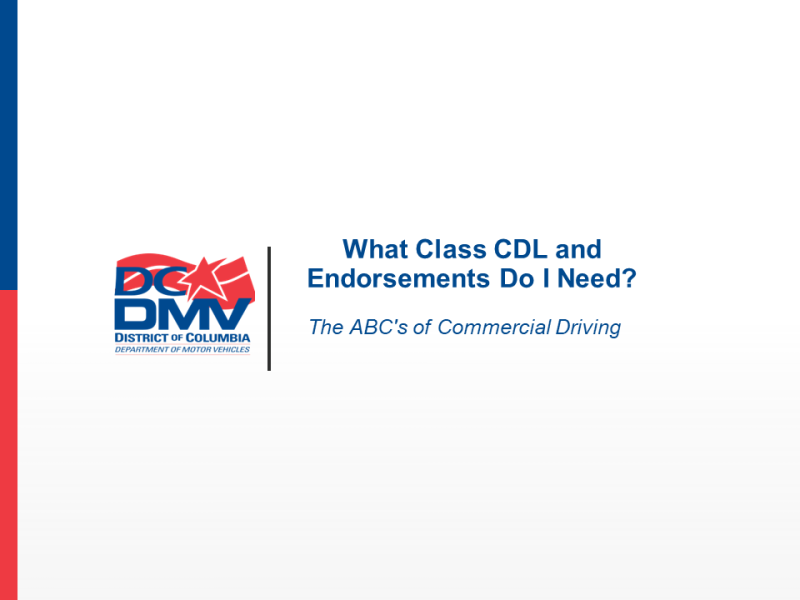
Important CDL Updates
Entry-Level Driver Training Requirement
Beginning February 7, 2022, entry-level drivers will be subject to the requirements in the Entry-Level Driver Training (ELDT) regulations. This includes drivers applying to:
- Obtain a Class A or Class B CDL for the first time;
- Upgrade an existing Class B CDL to a Class A CDL; or
- Obtain a school bus (S), passenger (P) or hazardous materials (H) endorsement for the first time.
The ELDT regulations establish a Federal standard for training CDL applicants. Applicants must successfully complete this training before they will be permitted to take the CDL skills test or, in the case of the H endorsement, the knowledge test. Drivers will search for a training provider using the upcoming Training Provider Registry. For more information, please visit the Entry-Level Driver Training (ELDT) webpage.
Human Trafficking Awareness Training Requirement
Effective July 12, 2021 District law (DCMR Title 18, Section 1303) requires all new drivers seeking a commercial learner permit (CLP) and those looking to convert an out-of-state CDL to complete mandatory Human Trafficking Awareness training before being issued a CLP or converting an out-of-state CDL.
The training involves watching a brief educational film and takes about 15 minutes to complete. The required training can be completed online and a printed certificate of completion will be issued upon successful completion of the online training.
Clearinghouse Status and CDL Downgrades
As established in the first Clearinghouse final rule, drivers with a “prohibited” Clearinghouse status are prohibited from operating a commercial motor vehicle (CMV) on public roads. The second Clearinghouse final rule (Clearinghouse-II) further supports this by ensuring that drivers with a “prohibited” Clearinghouse status do not continue to hold a commercial driver’s license (CDL) or commercial learner’s permit (CLP).
Beginning November 18, 2024, State Driver Licensing Agencies (SDLAs) will be required to remove the commercial driving privileges from the driver license of an individual subject to the CMV driving prohibition. This would result in a downgrade of the license until the driver completes the return-to-duty (RTD) process.
Note: SDLAs with legislative authority currently have the option to voluntarily query the Clearinghouse and downgrade CDLs for prohibited drivers and may do so before the November 18, 2024 compliance date.
Learn more about the second Clearinghouse final rule.
The Clearinghouse is a secure online database that gives employers, the Federal Motor Carrier Safety Administration (FMCSA), State Driver Licensing Agencies (SDLAs) and State law enforcement personnel real-time information about CDL and CLP holders’ drug and alcohol program violations.
The Clearinghouse contains records of violations of drug and alcohol prohibitions in 49 CFR Part 382, Subpart B, including positive drug or alcohol test results and test refusals. When a driver completes the RTD process and follow-up testing plan, this information is also recorded in the Clearinghouse.
For more information, please visit the Drug and Alcohol Clearinghouse website.
CDL Medical Certification Update
Click on the image above to download in PDF format.
The ABC's of Commercial Driving
Click on the image above to view more information in PDF format.
To get a DC DMV CDL learner permit, you must go to the Deanwood Road Test/CDL Services Office with all of the required documentation, take the applicable knowledge tests and pay the appropriate fees.
When you pass your knowledge tests, you will receive a 45-day temporary paper learner permit and your permanent learner permit will be mailed to your address of record. Your DC DMV CDL learner permit authorizes you to operate a designated class of vehicles if accompanied by a driver licensed to operate such vehicles. Effective February 26, 2019, any new CDL learner permits issued will be valid for one year and are non-renewable.
Once your CDL learner permit expires, you must retest to get it again.
DC DMV CDL learner permits may only have the following endorsements (with additional restrictions):
- S - School Bus
- P - Passenger




